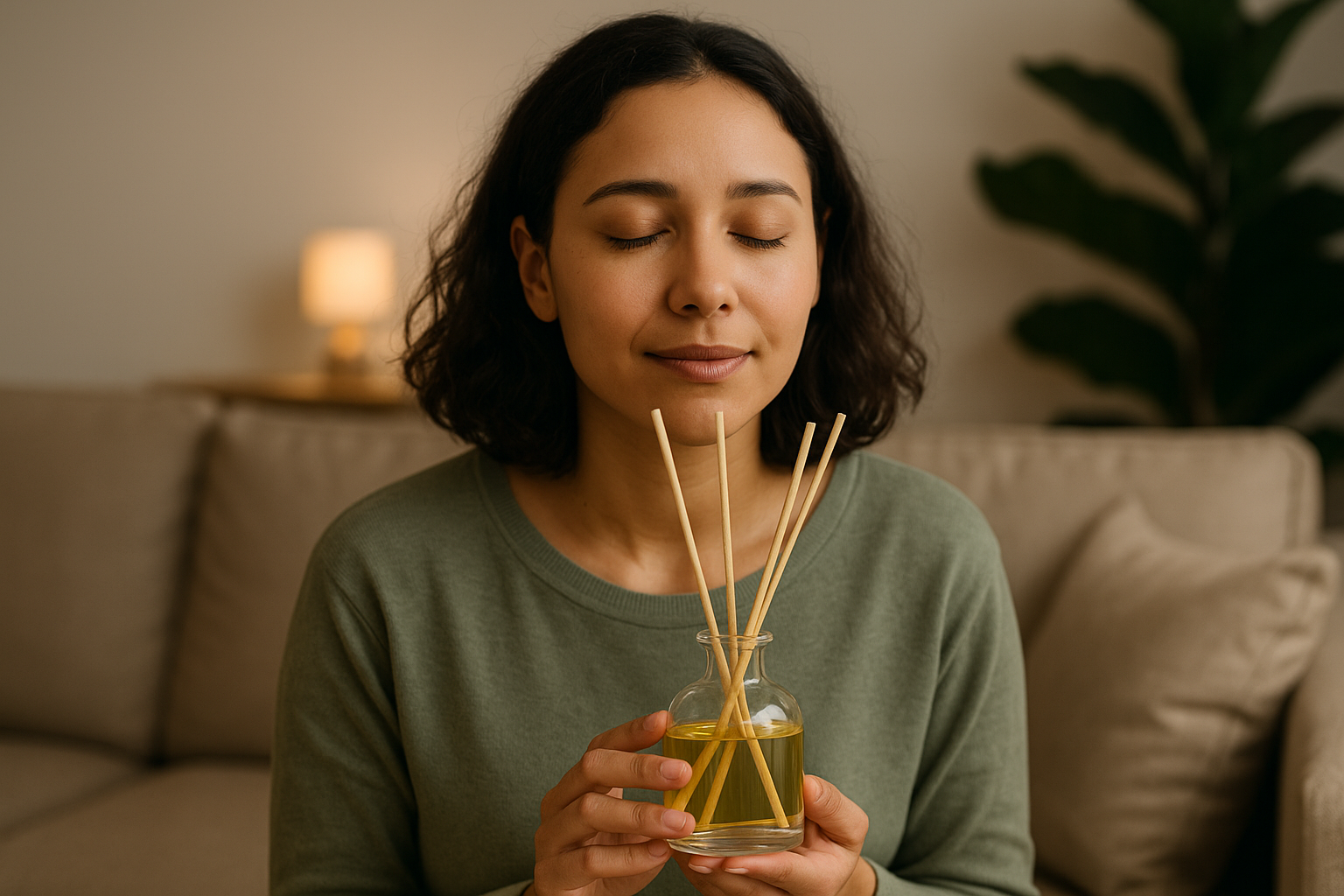Fragrance is not decoration. It is a direct line to memory, mood, and the body’s nervous system. A single sprig of rosemary can sharpen focus.
A spray of marcela can soften anxiety. The smell of sage smoke can reset a heavy atmosphere.
In the home, fragrance becomes more than sensory pleasure. It shapes emotional health. It turns rooms into safe places, supports family harmony, and guides transitions between work, rest, and social life.
Modern science confirms what traditional Gaúcho culture has practiced for centuries: the right aromas transform both environment and mind.
This article explores how fragrance affects emotional well-being, why the home is the best place to apply it, and how to use Gaúcho herbs and blends to build a healthier, more balanced emotional life.
Why scent affects emotions
The limbic system connection
When you smell something, molecules travel straight to the olfactory bulb. From there, they connect directly to the limbic system—the brain’s center for emotion, memory, and instinct. Unlike sight or hearing, smell bypasses rational filters.
That is why fragrance can trigger an old memory instantly. It is also why the right aroma can calm nerves, lift mood, or restore focus in seconds.
The chemistry of calm and focus
Marcela flowers contain flavonoids that influence serotonin, promoting relaxation. Rosemary’s cineole boosts acetylcholine, sharpening memory. Sage contains compounds that interact with GABA receptors, lowering stress. Each fragrance is not just symbolic but biochemical.
The psychology of association
Beyond chemistry, scent builds associations. If your bedroom always carries a marcela mist at night, your body learns that smell means rest. If your desk has rosemary nearby, your brain links it to focus. Over time, these associations become powerful emotional anchors.
The role of fragrance in the home
Creating safe spaces
Fragrance marks boundaries. A sage bundle at the door says “this space is cleansed.” A marcela pillow spray tells the body “this is where you can rest.” Smell creates safety signals stronger than words.
Regulating mood
A fresh kitchen spray lifts energy. A calming blend in the living room encourages slower evenings. A boldinho bowl in the bathroom adds freshness that reduces tension. The home becomes a system of emotional cues.
Supporting family harmony
Shared rituals around fragrance strengthen bonds. Preparing guaco tea while its steam perfumes the room becomes an act of care. Children who pinch sachets weekly learn responsibility and memory together.
Fragrance and specific emotions
Stress and anxiety
Marcela’s gentle floral scent lowers tension. Boldinho’s freshness clears mental fog. A spray before bed or a bowl near work areas can soften daily stress.
Focus and clarity
Rosemary is the champion of concentration. A diffuser with rosemary and a touch of carqueja grounds the mind. Used in study corners, it improves productivity and lowers distractions.
Sadness and grief
Guaco’s sweetness combined with marcela creates comfort. Sage adds a ritual of renewal. These blends support emotional release during difficult periods.
Energy and motivation
Boldinho and rosemary sprays brighten mornings. Added citrus peel amplifies the effect. Kitchens and home offices benefit from these energizing aromas.
Connection and joy
Shared scents during meals or gatherings link people to moments. A simmer pot of marcela, rosemary, and orange peel becomes part of family memory.
How fragrance supports routines
Morning rituals
Spraying rosemary on curtains or diffusing boldinho in the kitchen signals the start of the day. It clears sleepiness and builds energy for tasks ahead.
Work and study
Keeping a rosemary sprig on the desk or a marcela mist nearby creates a scent-linked habit. The brain ties aroma to concentration, boosting effectiveness.
Evening transitions
As lights dim, marcela and guaco blends slow breathing. Sprays on linens or simmer pots in living rooms help shift from activity to rest.
Sleep preparation
A marcela pillow sachet or spray on sheets lowers heart rate and encourages deeper sleep. Over time, the smell becomes a natural sedative cue.
Weekly resets
Sage bundles or rosemary steam cleansings on Fridays or Sundays mark the end of cycles. Families feel closure and renewal, preparing emotionally for the next week.
Gaúcho herbs and their emotional impact
Marcela
Soft, calming, and symbolic of renewal. Best for relaxation, bedtime, and family rituals.
Rosemary
Bright, sharp, and energizing. Supports study, clarity, and motivation.
Boldinho
Fresh and earthy. Adds lightness to kitchens, bathrooms, and summer routines.
Guaco
Sweet and comforting. Creates emotional warmth and supports breath during colds or sadness.
Carqueja
Dry and grounding. Brings stability during stress, especially in autumn blends.
White sage
Smoky and cleansing. Resets atmosphere and creates symbolic thresholds.
Practical recipes for emotional wellness
Calming pillow spray
- 6 drops marcela oil
- 2 drops guaco oil
- 100 ml water + 1 tsp alcohol
Mist sheets 30 minutes before bed.
Focus diffuser blend
- 5 drops rosemary
- 3 drops marcela
- 2 drops carqueja
Diffuse in work areas for 20 minutes.
Stress relief simmer pot
- 1 tbsp marcela
- 1 rosemary sprig
- 1 strip orange peel
Simmer gently on the stove during busy afternoons.
Cleansing threshold spray
- 4 drops sage
- 3 drops rosemary
- 2 drops marcela
Dilute in 100 ml water + 1 tsp alcohol. Spray near doors weekly.
Joyful family blend
- 5 drops rosemary
- 4 drops marcela
- 2 drops guaco
Diffuse during family meals or gatherings.
Cultural perspective
For Gaúcho families, herbs were always emotional tools. Marcela collected on Easter symbolized hope. Rosemary at doors protected and welcomed. Sage smoke reset homes after conflict. These were not luxuries but emotional technologies.
Bringing these traditions into modern fragrance use connects emotional health to cultural identity. A home that smells of marcela and rosemary does not just smell nice—it smells like belonging.
Science confirms emotional effects
Research shows rosemary increases cognitive performance and lowers fatigue. Marcela flavonoids reduce anxiety in animal studies.
Sage smoke lowers airborne bacteria, linking cleanliness to safety. Aromatherapy trials show lavender and similar oils improve sleep, suggesting marcela works the same way.
Science validates what tradition practiced: fragrance shifts emotional states. This mix of cultural wisdom and modern evidence makes oils powerful tools for wellness.
Safety in emotional fragrance use
- Dilute oils properly to avoid irritation.
- Ventilate during diffusion or smoke rituals.
- Avoid strong oils near infants, pets, or sensitive individuals.
- Use subtlety. Strong scents overwhelm emotions instead of balancing them.
- Rotate blends to prevent nose fatigue and maintain impact.
Mistakes to avoid
Do not expect one aroma to fix everything. Match blends to context.
Do not spray oils directly in the air without carrier. Fabrics hold scent longer.
Do not run diffusers all day. 20–30 minutes is enough.
Do not mix more than four oils at once. Keep blends simple and clear.
A starter plan for emotional health at home
- Morning: Rosemary curtain spray for clarity.
- Afternoon: Boldinho and citrus simmer pot for freshness.
- Evening: Marcela-guaco spray on linens.
- Weekly: Sage cleansing ritual at thresholds.
- Seasonal: Carqueja blends in autumn, marcela blends in spring.
With these five steps, emotional balance becomes part of daily life.
Conclusion
Fragrance is a bridge between body and mind. It shapes emotions faster than words or thoughts. In the home, it creates safety, joy, and balance.
Essential oil blends made with Gaúcho herbs connect science with culture, turning houses into emotionally supportive spaces.
Marcela calms, rosemary sharpens, boldinho refreshes, guaco comforts, carqueja grounds, and sage resets. Together, they form a toolkit for emotional health.
By using fragrance intentionally, homes become more than shelter—they become sanctuaries of well-being, memory, and identity.

Marcela Cardozo is passionate about Southern Brazilian traditions and the cultural stories carried through natural scents. She blends knowledge of native herbs, essential oils, and regional rituals to create practical and inspiring content. Her writing connects ancestral wisdom with modern living, offering readers simple ways to bring authenticity, well-being, and meaning into their everyday lives.
